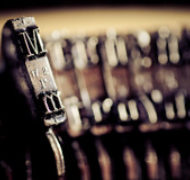Everything Matters: Editing as a Cultural Act
Blog / Produced by The High Calling
I am a professional back-seat driver. I sit in my lofty position and decide the fate of hundreds of writers a year: whether they will suffer the blow of a rejection letter or the death-by-a-thousand-little-pricks of a book contract. I’m an editor. I read book proposals and draft manuscripts and second revisions. I point out all their failings, from the picayune (“That comma is misplaced!”) to the pervasive (“Your logic is ungrounded!”). Writers fear me; they resent me. They wish I didn’t exist.
That’s on a bad day.
On a good day I’m a midwife, holding authors’ hands and breathing anxious breaths alongside them, helping them through the arduous and emotionally wrenching work of bringing their gift to publication. I get to be a witness to the evolution of great ideas, to be the sounding board of audacious thoughts, to be the student of great undiscovered teachers. I get to celebrate countless milestones with authors, from the news of their book’s acceptance for publication to the signing of their contract to the registration of their book with the Library of Congress and the Copyright Office, to the book’s first printing, first sale, first review, first reprint. I even get to dole out money to authors, demonstrating the real material value of the thoughts in their heads.
Whatever kind of day I’m having, it’s hard to think of editing as a creative act. An editor is always attending to the cultural artifact of someone else’s imagination. The best editing, no matter how heavy, is invisible to the reader—hardly the marking of culture being made.
And yet culture making is exactly what takes place when one edits. An editor coaxes and guides an idea, even a germ of an idea—even an atom on the surface of a germ of an idea—out of an author and onto a page. It’s editing that eases the passage of an author from self-protection to self-disclosure, from guarding and doubting her secret epiphanies to sharing them with a waiting audience. Culture isn’t culture until it’s conspiratorial—until more than one person has taken it in and breathed it out—and in the case of words strung together into a book, the editor is the first co-conspirator.
And then there’s the little thing about saving civilization as we know it. When Rome fell in the fifth century, it was left to the Irish to find, classify, archive, and ultimately disseminate the great works of the ancient West. The Green Martyrs of Ireland took on the vocation of editing, and they did it with a pious urgency but also an eager delight. These monks taught us that editing can be like a journey into uncharted territory, a quest for the Next Big Idea or the Best Refutation of the Latest Bad Idea.
In my pursuit of book acquisitions, I’ve met people who have become friends for life, people who have influenced for the better the way I see the world and make my way through it. As I edit a manuscript, I test my own untested assumptions even as I challenge the author’s. I uncover new insights even as I enjoy the new ground the author has covered. The people I’ve edited have changed me in large and small ways. So has the act of editing itself.
Once you start editing, you’ll never look at the world the same way again. It’s different already—in part because of what you’re editing, in part because by editing you’re re-asserting the best of what’s already in the world and calling forth the best of what might be next. We’re all editors, I think, because among all the things God is, he is the author of creation, and he loves the process of revision and refinement as much as the act of creation itself. God is editing us even as he trusts us to edit his magnum opus.
What’s not to like about that?
* * * * *
The "Everything Matters" Collection
- Creating a High Calling Culture
- Everything Matters: Editing as a Cultural Act
- Everything Matters: Easter as a Cultural Act
- Everything Matters: Teaching as a Cultural Act
- Everything Matters: From Rusty Chevy to Chrome-Plated Couch
- Everything Matters: Managing Operations as a Cultural Act
- Everything Matters: Reading as a Cultural Act
- Everything Matters: Hospitality as a Cultural Act
- Everything Matters: Living Alone as a Cultural Act
- Everything Matters: Travel as a Cultural Act
- Everything Matters: Public Relations as a Cultural Act
- Everything Matters: Playing Video Games as a Cultural Act
- Everything Matters: Book Publicity as a Cultural Act
Image by Markus Mayer. Used with permission. Sourced via Flickr.





